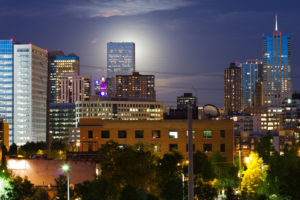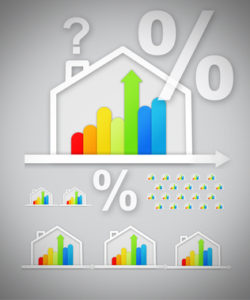10 Reasons to Move to Denver Right Now

An eerie glowing full moon rises behind a tall skyscraper in the Denver Colorado skyline.
1) If you haven’t already heard, Denver has 300 days of sunshine per year. It keeps us cheerful and bright. Sunshine combats Seasonal Affective Disorder and allows us to occasionally wear shorts in December.
2) The mountains are right there. Not a skier or snowboarder? Hike. Kayak. Climb. Snowshoe. Stand-Up Paddleboard on the rivers. Take photographs. Breathe. Even if you choose to never set foot in the mountains, the front range always looks stunning from the city.
3) Strong economy. Denver has diverse and growing industries – technology, natural gas, clean energy, mutual funds, tourism. Our unemployment rate is lower than that of New York City.
4) No shortage of great restaurants. When I need to entertain guests, my problem isn’t “Which restaurant is good enough?” My problem is “Which great restaurant is perfect for this occasion?”
5) Lower cost of living than coastal cities. Considerably lower. The median price of a single-family home in Denver was $285,000 in the third quarter of 2013, compared to New York’s median of $515,000.
6) Parks. (No, not Allison Parks, though I am a GREAT reason to move to Denver.) Denver has the largest city park system in the nation. Denver has more than 200 parks within the city and 20,000 acres of parks in the nearby mountains, including spectacular Red Rocks Amphitheatre. The city has its own buffalo herd and every year plants more than 200,000 flowers in 26 formal flower gardens.
7) Denver is a cultural city with the second highest educated population in America. In its Old West days, Denver had a performance of Macbeth before it had a school or a hospital. Today, the Denver Performing Arts Complex has nine theatres seating 10,000 people and is second only to New York’s Lincoln Center. The seven county metro area has a self-imposed sales tax for the arts that raises up to $40 million a year, which is distributed to 300 arts organizations and facilities.
8) Denver is one of only a few cities to have seven professional sports teams. Denver also has horse racing and a professional rodeo. Denver has 90 golf courses, 850 miles of bike paths and the nation’s largest city park system.
9) Denver brews more beer than any other city. If you’re a beer lover, you could tour artisan breweries for days.
10) Denver really is the Mile High City. There is a step on the State Capitol Building that is exactly 5,280 feet above sea level. In Denver’s rarified air, golf balls go ten percent farther. So do cocktails. Alcoholic drinks pack more of a wallop than at sea level. The sun feels warmer, because you’re closer to it, but your coffee is cooler, because water boils at 202 degrees.











